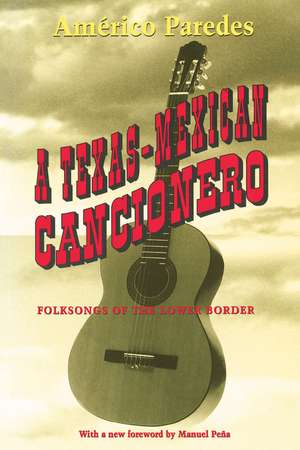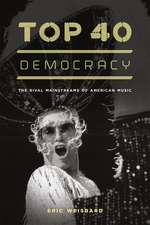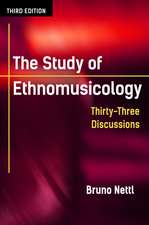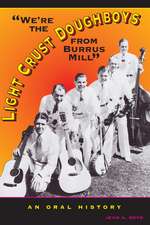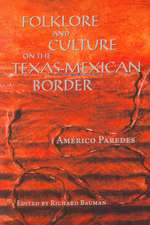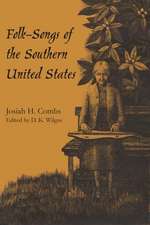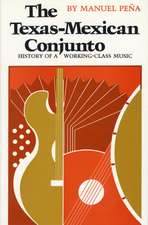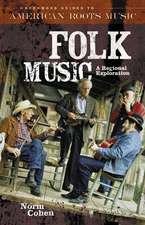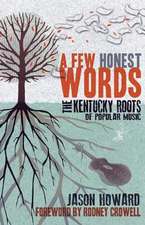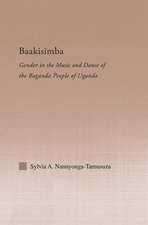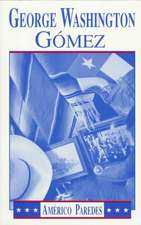A Texas-Mexican Cancionero: Folksongs of the Lower Border
Autor Américo Paredes Introducere de Manuel Peñaen Limba Engleză Paperback – apr 1995
Preț: 191.14 lei
Nou
Puncte Express: 287
Preț estimativ în valută:
36.58€ • 37.87$ • 30.92£
36.58€ • 37.87$ • 30.92£
Carte tipărită la comandă
Livrare economică 06-20 martie
Preluare comenzi: 021 569.72.76
Specificații
ISBN-13: 9780292765580
ISBN-10: 0292765584
Pagini: 226
Ilustrații: 18 Ht, 1 Map, 66 Figs (Music)
Dimensiuni: 152 x 229 x 15 mm
Greutate: 0.34 kg
Ediția:Univ of Texas P
Editura: University of Texas Press
Colecția University of Texas Press
ISBN-10: 0292765584
Pagini: 226
Ilustrații: 18 Ht, 1 Map, 66 Figs (Music)
Dimensiuni: 152 x 229 x 15 mm
Greutate: 0.34 kg
Ediția:Univ of Texas P
Editura: University of Texas Press
Colecția University of Texas Press
Notă biografică
A distinguished senior scholar, the late Américo Paredes was the Dickson, Allen, Anderson Centennial Professor Emeritus of Anthropology and English at the University of Texas at Austin. In 1990 he received the Order of the Aztec Eagle, the highest honor Mexico bestows on foreigners.
Cuprins
- Preface
- Introduction
- Foreword by Manuel Peña
- Part I. Old Songs from Colonial Days
- 1. La pastora
- 2. La ciudad de Jauja
- 3. El borrego gordo
- 4. El marrano gordo
- 5. Delgadina
- 6. Elena
- Part II. Songs of Border Conflict
- 7. Los inditos
- 8. El general Cortina
- 9. Los franceses
- 10. A Zaragoza
- 11. A Grant
- 12. Kiansis I; Kiansis II
- 13. La Pensilvania
- 14. Rito García
- 15. Los pronunciados
- 16. El capitán Hall
- 17. José Mosqueda
- 18. Gregorio Cortez
- 19. Ignacio Treviño
- 20. Jacinto Treviño
- 21. Los sediciosos
- 22. Pablo González
- 23. Alonso
- 24. Arnulfo
- 25. Alejos Sierra
- 26. Laredo
- 27. La toma de Ciudad Juárez
- 28. La toma de Matamoros
- 29. El Automóvil Gris
- 30. No decías, Pancho Villa
- 31. La persecución de Villa
- 32. Benjamín Argumedo
- 33. Felipe Angeles
- 34. Mariano Reséndez
- 35. Los tequileros
- 36. Dionisio Maldonado
- 37. El contrabando de El Paso
- 38. Manuel Garza de León
- 39. La canción de Carlos Guillén (El prisionero de San Juan de Ulúa)
- 40. Las once acaban de dar
- Part III. Songs for Special Occasions
- 41. Las posadas
- 42. Los aguinaldos
- 43. Señora Santa Ana
- 44. Don Pedrito Jaramillo
- 45. La realidad
- 46. El huérfano
- 47. La chiva
- 48. El charamusquero
- Part IV. Romantic and Comic Songs
- 49. Trigueña hermosa
- 50. La negrita
- 51. La tísica
- 52. A las tres de la mañana
- 53. Andándome yo paseando
- 54. El colúmpico
- 55. La borrega prieta
- 56. Malhaya la cocina
- 57. Dime sí, sí, sí
- 58. Carta escrita sobre un cajón
- 59. El crudo
- Part V. The Pocho Appears
- 60. Bonita esta tierra
- 61. Desde México he venido
- 62. Los mexicanos que hablan inglés
- 63. From a Border Zarzuela
- 64. Mucho me gusta mi novia
- 65. Ya se va la televisión
- 66. Tex-Mex Serenade
- Epilogue
- Notes to the Songs
- Glossary
- Bibliography
- Index
Recenzii
...Paredes writes with both the first-hand authority of a cultural insider and an experienced scholar’s care for documentation. His clear, direct and personal style makes the book the most widely useful textbook on a regional Mexican musical tradition since his earlier work, ‘With His Pistol in His Hand’: A Border Ballad and Its Hero.
Paredes makes possible a greater understanding of how ordinary people react and reacted to the experience of living on the border, politically, socially, and personally, between two cultures. It is of major importance in the social history of the area.
...highly useful for courses in Chicano politics, folklore, sociology, and anthropology.
Paredes' book should be read by everyone interested in Mexican American history.
Descriere
Sixty-six folksongs from Tejano culture.
